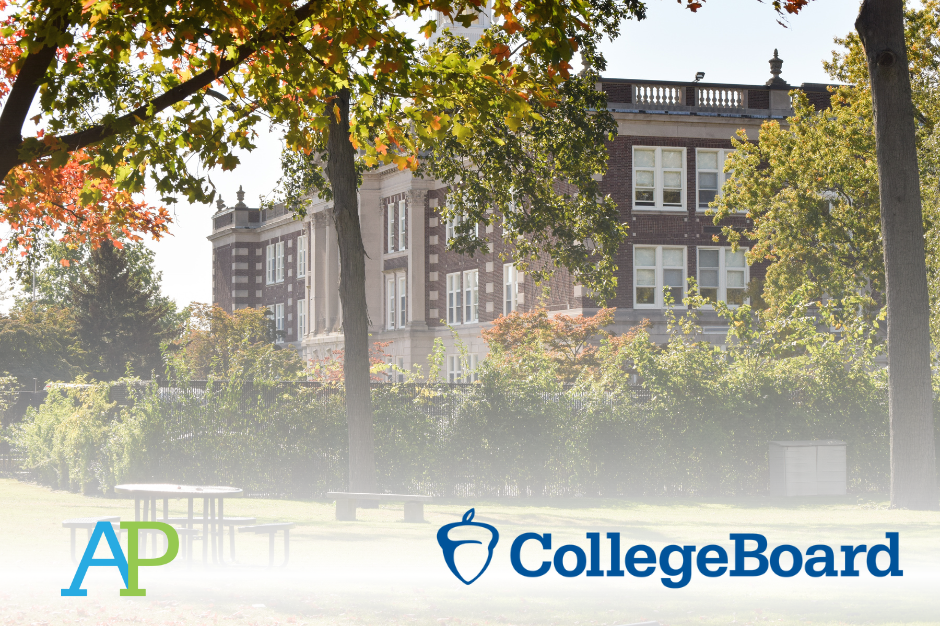Mamaroneck High School’s Advanced Placement (AP) program, a selection of open-enrollment college-level courses currently offered to Juniors and Seniors, may see a large expansion in the coming years: course offerings for underclassmen, specifically Sophomores.
School districts nationwide have been offering select AP-level courses to sophomores and even freshmen for decades, though Mamaroneck has up until now held firm on their commitment to a juniors-and-seniors-only policy. This year, that policy has a unique caveat: the introduction of AP Spanish Language and Culture to 10th Grade Students in Mamaroneck’s Dos Caminos program, a separate learning experience at Mamaroneck whose founding cohort is now reaching Sophomore year. When asked why Dos Caminos students were receiving unique AP offerings, Ariana Cohen, President of Mamaroneck’s Board of Education, told The Globe “…we never want kids to be stuck.” Students enrolled in this program receive bilingual education starting in elementary school, while the majority of Mamaroneck students take a World Language as an elective offering starting in 8th Grade. By the time Dos Caminos students reach sophomore year, they are “on track” to take the AP Spanish course, albeit earlier than other Mamaroneck students, who typically take the course in senior year. In general, Cohen says the district “always want[s] kids to get to their highest…” and AP Spanish offers 10th graders in Dos Caminos the ability to reach this goal.
Where does that leave other Mamaroneck Sophomores? Cohen says students in the rest of the 10th Grade may not be “as obviously stuck,” something that the Board of Education wants to look at. Could the BOE mean that students proficient in History, English, Mathematics, or Science are also unable to reach their highest with the current course offerings? Parents and students are thinking similarly: Cohen added that questions about expanding AP courses to all Sophomores were brought up during a general comment session at a Fall board meeting, encouraging the Board to ask questions to district leaders about the potential change.
The conversation is in its infancy: for now, the Board’s primary goal, according to Cohen, is to look at “budget limitations” and understand what they can do to support program expansions: for the final decision, they will defer to high school leaders, who’ve “historically said philosophically [adding 10th Grade APs] wasn’t where we were,” says Cohen. Athena Maikish, Vice-President of the Board of Education, remarked that “we’re in a pretty significant generational swap” at Mamaroneck right now, ushering in perhaps the largest set of new leaders Mamaroneck has seen in the past decade, including a new Superintendent this week. These administrators will potentially have new viewpoints on AP classes as they look forward for MHS.
One of those leaders, High School Principal Lina Carolini-Cannavo, confirmed that adding sophomore AP offerings “was asked about recently by the Board of Education,” saying it’s “something we’ve been talking about for a long time.” Cannavo is considering the impact of an expansion like this, including the value of “all students being in the same courses…in the beginning years of high school,” a unique feature of Mamaroneck she called “fundamental.” Cannavo also points out that students can already take honors pathways in Math and Foreign Languages. “There are…new courses that are available,” but Cannavo will look to assess the positive and negative value of allowing students to take different paths in more departments in Sophomore year.
Cannavo also highlighted the importance of “evaluat[ing] the educational value and social-emotional value” of a decision like this, saying “[work life balance] needs to be addressed at the academic level.” “I don’t make any decision by myself,” Cannavo added, but said “if we were to introduce [10th grade APs] I would favor a limit.” For a long time, MHS AP offerings have been open-enrollment barring scheduling conflicts. Seniors, for example, are entitled to one AP social studies class and can be scheduled for two, should space allow. A hypothetical limit for Sophomores would be a shift from this policy, but is one of many ideas Cannavo is thinking about to promote balance and mental health among students, should an AP offering for sophomores happen. It is unclear if this change could be extended to juniors and seniors.
She’ll have the help of her administrative team to make a final decision, and they’ll look at student, teacher, and community perspectives before making any changes.
Cohen agrees, saying stakeholder perspectives are “absolutely” the priority in this realm, and a necessary first step as the Board, according to Maikish, is “hoping that…in a year or two, this conversation will have gotten a lot farther.”
Teachers aren’t moving as quickly. Joseph Liberti, an AP US Government teacher who created the Original Civic Research and Action (OCRA) elective, which helps students implement community action projects, is skeptical about expanding APs to Sophomores. He finds the curriculums to be, even for juniors and seniors, “constricting in both content and creativity…that intentionally do not promote divergent thinking.” Liberti thinks Mamaroneck should focus on “empowering…[their] talented faculty…to be creative” in developing their own curricula rather than buying into, as he describes it, “curriculum-in-a-box.”
One faculty member they could turn to? Peter Greene, both a 10th Grade Global History and AP European History. Greene feels the Global History curriculum allows him the flexibility to focus on “different content” that he finds meaningful for students rather than having to strictly adhere to “the demands of the [AP] curriculum” or “the schedule of the AP school year ending in May,” elements that, in his eyes, make classes “unrealistic” to teach and, from the perspective of a student, “pretty miserable.”
If history teachers are to continue providing experiences that help make students, in the words of the Mamaroneck School District Mission, “responsible citizens in a multicultural world,” both Greene and Liberti argue that won’t come from mundane and rushed instruction, a “style…[that] is almost encouraged” and forces teachers to give “combined, [and therefore] inferior lessons” on topics, according to Greene.
Some members of the Mamaroneck student body are more favorable towards the addition of AP offerings to sophomores. Leo Federspiel (‘26) feels that since so many other high schools offer these opportunities, the Mamaroneck system “is putting us behind.” A similar sentiment is shared by Nolan Keating (‘24), who “would’ve loved to have the opportunity to take” an AP as a sophomore, noting his desire for a more challenging course as well as a more in-depth course in a subject he was interested in. He feels that students who are willing and able to handle the rigor of AP courses should be able to take one, just like so many other students of similar ilks nationwide.
Therese Valdez, a Mamaroneck AP Calculus teacher, agrees that it’s okay for students to look for more rigor through APs “as long as they have the prerequisites.” She says it’s wrong to “stop sophomores and even freshmen from taking APs because you don’t think they are mature enough,” claiming “some kids are…ready.” Speaking on acceleration, like taking APs, in the Math Department specifically, she thinks “the earlier the better,” aligning with the Board’s view that Mamaroneck looks for students to reach their highest. If you’re thinking about adding that first Sophomore AP for college, however, Valdez says “that’s not the reason you should take [an AP] class.”
One thing the BOE is not interested in: scaling back. Cohen says, “we rarely look for less” and that the Board “does not want to lose programs ever,” so it’s unlikely that Mamaroneck will pull back any of its current AP offerings, despite concerns such as those of Liberti and Greene.
As for what’s coming, Cohen says the Board is still asking questions about what sophomore AP offerings across all departments would look like, and accordingly, specific courses “haven’t yet been [brought to us].” The Globe will continue to follow this story as it develops.









